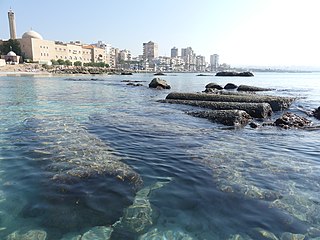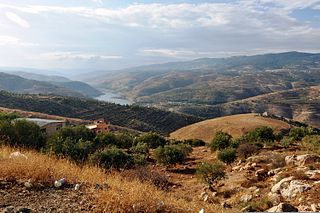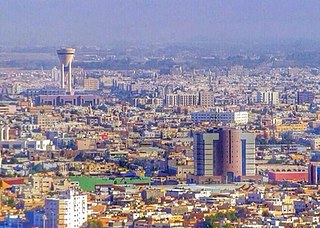See also
![]() This article incorporates text from a publication now in the public domain : Easton, Matthew George (1897). "Raamah". Easton's Bible Dictionary (New and revised ed.). T. Nelson and Sons.
This article incorporates text from a publication now in the public domain : Easton, Matthew George (1897). "Raamah". Easton's Bible Dictionary (New and revised ed.). T. Nelson and Sons.
Raamah (Hebrew : רַעְמָה, Raʿmh) is a name found in the Torah, meaning "lofty" or "exalted", and possibly "thunder".
The name is first mentioned as the fourth son of Cush, who is the son of Ham, who is the son of Noah in Gen. 10:7, and later appears as a country that traded with the Phoenician city-state of Tyre, in Ezekiel 27:22. It has been connected with Rhammanitae mentioned by Strabo in the southwest Arabian Peninsula, and with an Arabian city of Regmah at the head of the Persian Gulf. [ clarification needed ]
This country of Raamah is usually assumed to be somewhere in the region of Yemen; Sheba was a son of Raamah, and his descendants are often held to be included among the Sabaeans.[ citation needed ] Dedan, son of Raamah. Apparently a region of the Medina Province of Saudi Arabia.[ citation needed ]
However, there was also an Israelite city called Ramah , somewhat closer to Tyre.
![]() This article incorporates text from a publication now in the public domain : Easton, Matthew George (1897). "Raamah". Easton's Bible Dictionary (New and revised ed.). T. Nelson and Sons.
This article incorporates text from a publication now in the public domain : Easton, Matthew George (1897). "Raamah". Easton's Bible Dictionary (New and revised ed.). T. Nelson and Sons.

Abimelech was the generic name given to all Philistine kings in the Hebrew Bible from the time of Abraham through King David. In the Book of Judges, Abimelech, son of Gideon, of the Tribe of Manasseh, is proclaimed king of Shechem after the death of his father.

Tyre is a city in Lebanon, one of the oldest continuously inhabited cities in the world, though in medieval times for some centuries by just a small population. It was one of the earliest Phoenician metropolises and the legendary birthplace of Europa, her brothers Cadmus and Phoenix, as well as Carthage's founder Dido (Elissa). The city has many ancient sites, including the Tyre Hippodrome, and was added as a whole to the list of UNESCO World Heritage Sites in 1984. The historian Ernest Renan noted that "One can call Tyre a city of ruins, built out of ruins".

Canaan was a Semitic-speaking civilization and region of the Southern Levant in the Ancient Near East during the late 2nd millennium BC. Canaan had significant geopolitical importance in the Late Bronze Age Amarna Period as the area where the spheres of interest of the Egyptian, Hittite, Mitanni, and Assyrian Empires converged or overlapped. Much of present-day knowledge about Canaan stems from archaeological excavation in this area at sites such as Tel Hazor, Tel Megiddo, En Esur, and Gezer.

Sheba is an ancient kingdom mentioned in the Hebrew Bible and the Quran. It particularly features in the tradition of Orthodox Tewahedo in today's Yemen and is also asserted as the home of the Queen of Sheba, who is left unnamed in Jewish texts, but is known as Makeda in Ethiopian texts and as Bilqīs in Arabic texts. According to the Jewish historian Josephus, Sheba was the home of Princess Tharbis, who is said to have been the wife of Moses before he married Zipporah.

Moriah is the name given to a mountainous region in the Book of Genesis, where the binding of Isaac by Abraham is said to have taken place. Jews identify the region mentioned in Genesis and the specific mountain in which the near-sacrifice is said to have occurred with "Mount Moriah", mentioned in the Book of Chronicles as the place where Solomon's Temple is said to have been built, and both these locations are also identified with the current Temple Mount in Jerusalem. The Samaritan Torah, on the other hand, transliterates the place mentioned for the binding of Isaac as Moreh, a name for the region near modern-day Nablus. It is believed by the Samaritans that the near-sacrifice actually took place on Mount Gerizim, near Nablus in the West Bank.
Cush or Kush, according to the Hebrew Bible, was the oldest son of Ham and a grandson of Noah. He was the brother of Mizraim, Phut, and Canaan. Cush was the father of Nimrod.

Gilead or Gilad is the ancient, historic, biblical name of the mountainous northern part of the region of Transjordan. The region is bounded in the west by the Jordan River, in the north by the deep ravine of the river Yarmouk and the region of Bashan, and in the southwest by what were known during antiquity as the "plains of Moab", with no definite boundary to the east. In some cases, "Gilead" is used in the Bible to refer to all the region east of the Jordan River. Gilead is situated in modern-day Jordan, corresponding roughly to the Irbid, Ajloun, Jerash and Balqa Governorates.
Joktan was the second of the two sons of Eber mentioned in the Hebrew Bible. He descends from Shem, son of Noah.

Job is the central figure of the Book of Job in the Bible. In Islam, Job is also considered a prophet.

Tabuk is the capital city of the Tabuk Region in northwestern Saudi Arabia. It has a population of 594,350. It is close to the Jordan–Saudi Arabia border and houses the largest air force base in Saudi Arabia.
Dedan has several different meanings in the Hebrew Bible. Dedan was an oasis and city-state of north-western Arabia. The people of Dedan are called Dedanim or Dedanites. Dedan is also the name of the son of Raamah and the son of Jokshan.

Duba is a small city on the northern Red Sea coast, of Saudi Arabia. It is in Tabuk Province. Local citizens describe it as The Pearl of the Red Sea. The population of Duba is about 39,000.
Almodad was a descendant of Noah and the first named son of Joktan in Genesis 10:26 and 1 Chronicles 1:20. While the Bible has no further history regarding Almodad, this patriarch is considered to be the founder of an Arabian tribe in "Arabia Felix". This is based on the identification of Joktan's other sons, such as Sheba and Havilah, who are both identified as coming from that region.

The history of ancient Lebanon traces the course of events related to the geographic area in the Eastern Mediterranean of what is now known as Lebanon from the beginning of antiquity to the beginning of Arab rule.

Eastern Arabia, is a region stretched from Basra to Khasab along the Persian Gulf coast and included parts of modern-day Bahrain, Iraq, Kuwait, Oman, Qatar, Saudi Arabia, and the United Arab Emirates. The entire coastal strip of Eastern Arabia was known as "Bahrain" for a millennium.
Kenizzite was an Edomite tribe referred to in the covenant God made with Abraham. They are not mentioned among the other inhabitants of Canaan in Exodus 3:8 and Joshua 3:10 and probably inhabited some part of Arabia, in the confines of Syria.

Phoenicia, or Phœnicia, or the Phoenician city-states, were an ancient Semitic maritime civilization originating in the coastal strip of the Levant region of the eastern Mediterranean, primarily located in modern Lebanon. The territory of the Phoenicians expanded and contracted throughout history, with the core of their culture stretching from Arwad in modern Syria to Mount Carmel. The Phoenicians extended their cultural influence through trade and colonization throughout the Mediterranean, from Cyprus to the Iberian Peninsula.
Transjordan, the East Bank, or the Transjordanian Highlands, is the part of the Southern Levant east of the Jordan River, mostly contained in present-day Jordan.

Ezekiel 27 is the twenty-seventh chapter of the Book of Ezekiel in the Hebrew Bible or the Old Testament of the Christian Bible. This book contains the prophecies attributed to the prophet/priest Ezekiel, and is one of the Books of the Prophets. This chapter contains a lamentation for the fallen city of Tyre.

Since early modern times, a number of biblical ethnonyms from the Table of Nations in Genesis 10 have been used as a basis for classifying human racial and national identities. The connection between Genesis 10 and contemporary ethnic groups began during classical antiquity, when authors such as Josephus, Hippolytus and Jerome analyzed the biblical list.